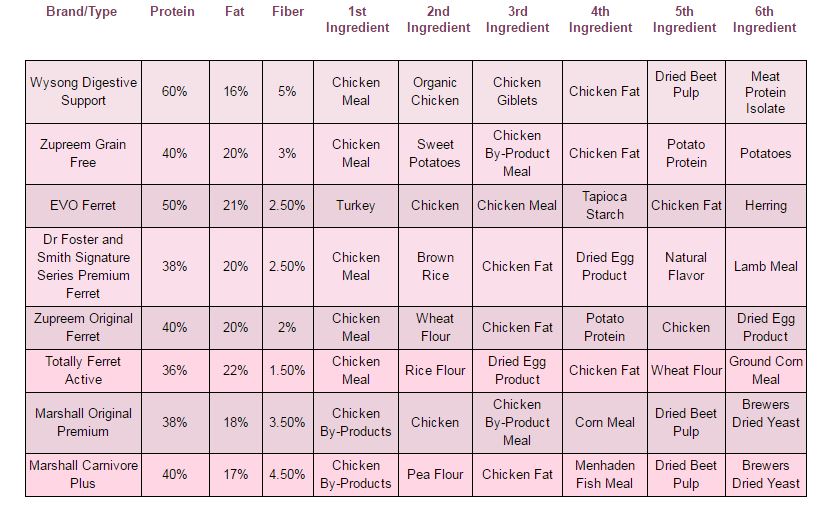Ferrets are adorable and playful pets that require a nutritious and balanced diet for their optimal health and well-being. As a responsible ferret owner, it’s essential to choose the right food for your furry friend. To make the selection process easier for you, we have created a comprehensive chart of the best food options for ferrets.
Top Ferret Food Brands
| Brand | Key Features | Price |
|---|---|---|
| 1. Marshall Premium Ferret Diet | Complete and balanced nutrition, high-quality ingredients | $ |
| 2. Wysong Ferret Epigen 90 | Grain-free, high protein content, no artificial additives | $$ |
| 3. Orijen Cat and Kitten Dry Food | Rich in animal protein, no grains, limited ingredients | $$$ |
| 4. ZuPreem Premium Daily Ferret Diet | Fortified with essential vitamins and minerals | $ |
| 5. Blue Buffalo Wilderness High Protein Dry Cat Food | Grain-free, real meat as the first ingredient | $$ |
It’s important to note that while ferrets have specific dietary needs, some cat foods can also be suitable for them due to similar nutritional requirements.

Credit: www.pinterest.com
Types of Ferret Food
- Dry Food: Dry kibble is a popular choice as it is convenient and helps maintain dental health.
- Wet Food: Wet food provides additional hydration and is often more palatable for finicky eaters.
- Treats: Treats should be given sparingly and as part of a balanced diet.
Important Nutrients for Ferrets
Ferrets have unique dietary needs, and their food should be rich in:
- Protein: Look for high-quality animal protein sources like chicken or turkey.
- Fat: Ferrets require a high-fat diet to meet their nutritional needs.
- Taurine: An essential amino acid for heart and eye health.
- Vitamins and Minerals: Ensure the food is fortified with essential vitamins and minerals.
Feeding Recommendations
Feeding schedules for ferrets can vary depending on their age and activity level. Generally, adult ferrets should be fed twice daily, while kits (baby ferrets) require more frequent meals.
Feeding Chart:
| Age | Number of Meals per day | Recommended Daily Food Intake (in ounces) |
|---|---|---|
| Birth to 3 months | 4-6 | 1-4 |
| 4-7 months | 3-5 | 2-6 |
| 8-12 months | 2-4 | 3-6 |
| 1 year and older | 2 | 4-6 |
Always remember to provide fresh water alongside their meals to keep them hydrated.
Transitioning to a New Diet
When introducing a new type of food to your ferret, it’s essential to do it gradually to prevent digestive issues. Start by mixing a small portion of the new food with their current diet, gradually increasing the ratio over a week or two.

Credit: ferretlover.com
Monitoring Your Ferret’s Health
Regular veterinary check-ups are crucial to ensure your ferret’s overall health. Keep an eye out for any changes in their eating habits, weight, or appearance, as these can be indicators of underlying health problems.
Please note that this food chart serves as a general guideline. Individual ferrets may have specific dietary requirements or health conditions that require specialized diets. Consult with your veterinarian for personalized feeding recommendations.
Providing your ferret with a balanced and nutritious diet is essential for their well-being. Use this food chart as a starting point to select the best food for your furry friend and ensure they live a happy and healthy life!
Frequently Asked Questions Of Best Food For Ferrets Chart,
What Do Ferrets Eat In The Wild?
In the wild, ferrets primarily consume small prey like rodents and birds for their protein and fat needs.
Can Ferrets Eat Fruits And Vegetables?
Yes, ferrets can eat small amounts of fruits and vegetables as occasional treats, but these should not be the main part of their diet.
How Often Should I Feed My Ferret?
Feed your ferret 2-4 small meals per day to mimic their natural feeding pattern and prevent overeating.
Do Ferrets Need A Specialized Diet?
Yes, ferrets require a diet high in protein and fat, which is best achieved with specially formulated ferret food.

Leave a Reply